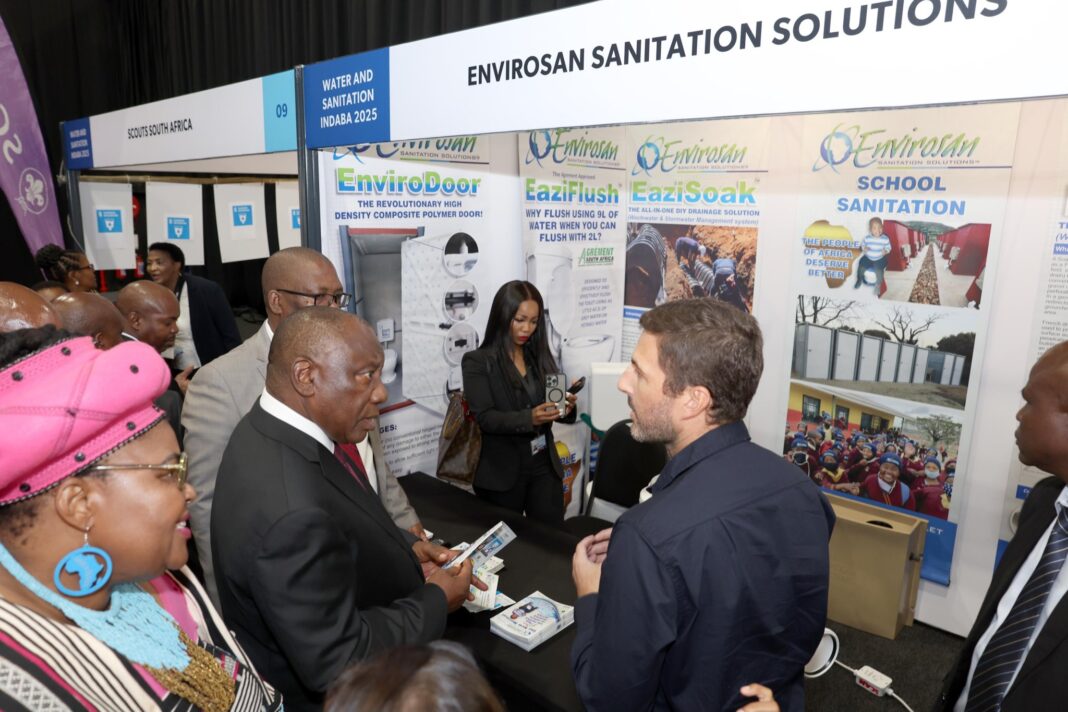By Thapelo Molefe
South Africa faces an impending water crisis, with nearly half of its treated water lost due to leaks, theft, and mismanagement, according to Sean Phillips, Director-General of the Department of Water and Sanitation.
Speaking at the 2025 Water and Sanitation Indaba on Thursday, Phillips said that without urgent and systemic reforms, the country’s water supply is at serious risk.
“Our country faces a water crisis of monumental proportions. If we do not take urgent steps to fix failing infrastructure, improve governance, and hold municipalities accountable, millions will be left without reliable water access,” Phillips told participants at the water and sanitation indaba.
Using slides to illustrate his points, Phillips stressed the urgent need for infrastructure investment, governance reforms, and stricter regulatory oversight to avert a full-scale collapse of the water sector.
He further outlined plans to clamp down on corruption, assist struggling municipalities, and enforce stricter accountability measures to reduce water losses and improve service delivery.
Earlier in the indaba, Minister of Water and Sanitation Pemmy Majodina reaffirmed the government’s commitment to treating water security as a national emergency.
Majodina called for a collective national effort to address the crisis.
“Water is a basic and fundamental right,” Majodina stressed.
“As we convene here today, we must commit to ensuring its sustainable management and reliability. This Indaba must serve as a platform to mobilise every stakeholder towards a long-term national water and sanitation turnaround strategy.”
Majodina’s remarks painted a stark picture of South Africa’s water security.
With 75% of the country’s water supply reliant on surface water and a consumption rate exceeding the global average (218 liters per capita daily compared to the global 173 liters), water stress is mounting.
Climate change, lack of infrastructure investment, and rampant water losses exacerbate the crisis.
“We are among the top 30 driest countries in the world, yet we have one of the highest water loss rates,” Majodina said.
She said water that is lost through leaks, theft, or unbilled consumption stands at 47%, significantly above the global 30% benchmark.
Despite these challenges, the government has initiated major projects to boost water security.
These include the uMkomazi and uMzimvubu water projects in KwaZulu-Natal and the Eastern Cape, respectively, as well as the Lesotho Highlands Water Project-Phase 2, which will benefit multiple provinces, including Gauteng.
Additionally, the government is rolling out alternative water supply methods such as desalination, groundwater extraction, and wastewater reclamation.
Majodina reaffirmed that the Medium-Term Development Plan (2025–2029) will prioritize initiatives aligned with the United Nations Sustainable Development Goal 6 (SDG 6), ensuring universal access to clean water and sanitation by 2030.
In a scathing assessment of municipal governance, Majodina revealed that municipalities owe Water Boards nearly R24 billion, jeopardizing the stability of bulk water supply.
A recent audit of the Blue, Green, and No Drop reports highlighted a significant decline in water quality management and wastewater treatment.
“Many Water Services Authorities, including metros, have failed to meet their constitutional obligations. Financial mismanagement, illegal connections, and vandalism of critical infrastructure are crippling our water systems,” Majodina said.
To address this, the government is launching a nationwide anti-corruption initiative in partnership with the Special Investigating Unit (SIU), which has already recovered R459 million from fraudulent water-related transactions.
Majodina underscored the urgency of action, emphasizing that the Water and Sanitation Indaba must yield concrete resolutions.
“Water is now the top priority of the 7th Administration. Our commitment must go beyond talk—municipal budgets must reflect water as a national priority, and all sectors must play their role in safeguarding our water resources,” she said.
Gauteng Premier Panyaza Lesufi reinforced the call for urgency, stressing the critical link between water access and economic stability.
“We cannot talk about economic growth and job creation when millions still lack access to clean water. It is our duty as leaders to ensure that no community is left behind,” Lesufi said.
South African Local Government Association (SALGA) President Bheki Stofile highlighted the urgent need for municipalities to improve service delivery, warning that municipal debt to water boards—now exceeding R24 billion—poses a severe threat to the sector’s financial viability.
He called for stringent measures to enforce municipal payment obligations and sound financial management.
On the other hand, Minister of Cooperative Governance and Traditional Affairs Velenkosini Hlabisa echoed the need for intergovernmental collaboration to resolve systemic inefficiencies.
He urged stronger partnerships between national and local governments, emphasizing that water security is a shared responsibility requiring cohesive planning and execution.
INSIDE METROS

